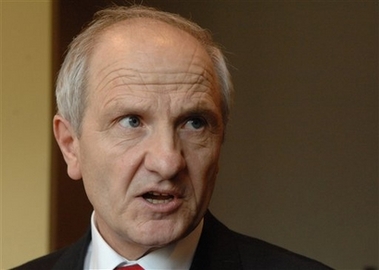UN council mulls Kosovo independence
(Reuters)Updated: 2007-04-04 09:25
UNITED NATIONS - There is "considerable support" within the UN Security Council for supervised independence for Kosovo, the council president said on Tuesday, but he said a vote on the breakaway Serbian province is unlikely soon.
 Kosovo President Fatmir Sejdiu talks to the media prior to a meeting of the Security Council at the United Nations, Tuesday, April 3, 2007 in New York. [AP]  |
After a council briefing by Ahtisaari, Britain's UN Ambassador Emyr Jones Parry, the council president for April, told reporters the governments of Britain, France, Germany, Italy, the United States and Russia would likely start drafting a possible council resolution this month.
"There was considerable support among member states for President Ahtisaari's proposals," Jones Parry told reporters, adding that the council would also decide in coming days on whether to visit Kosovo.
"I will expect further (council) discussions this month. I don't think it's likely there will be an early presentation of a Security Council resolution though," he said.
Kosovo is the last major dispute following the breakup of Yugoslavia marked by bloody wars in the 1990s.
Kosovo has been under UN administration since 1999, when NATO launched bombing raids to stop Serb forces from driving out the province's ethnic Albanians, who comprise 90 percent of the population.
MORE NEGOTIATIONS
Russia, a permanent member of the Security Council with veto power, has urged more negotiations to seek a solution acceptable to the ethnic Albanian Kosovars and the Serb minority.
Moscow has been careful not to outright reject Ahtisaari's independence proposals.
But France's UN Ambassador Jean-Marc de La Sabliere said he believed Russia was trying to slow the process and that any delays would be "very risky."
Russia has raised fears that granting independence for Kosovo would set a dangerous precedent for separatist groups elsewhere in places such as in Abkhazia or south Ossetia.
However, La Sabliere said Kosovo was not a precedent. "What is at stake is the stability of Europe and this is the completion of the process of the breakup of the former Yugoslavia, so it's a very specific situation," he said.
"To keep the status quo is not an option, it would be even dangerous," he said.
Serbian Prime Minister Vojislav Kostunica addressed the closed meeting of the Security Council on Tuesday, while a representative of the UN mission in Kosovo spoke on behalf of Kosovo President Fatmir Sejdiu.
Sejdiu, who did not address the council due to protocol issues, told reporters afterward that "unfortunately we have exhausted all possibilities of a negotiated agreement."
Kostunica called for new talks with a new mediator.
The Ahtisaari plan would give independence to the ethnic Albanian-majority but provides for a European Union overseer, an EU police mission alongside the current 16,500-strong NATO peace force and broad self-government for the remaining 100,000 Serbs.
|
||
|
||
|
|